Critical Analysis: Beccaria's 'On Crimes and Punishments' Report
VerifiedAdded on 2023/06/14
|5
|1097
|212
Report
AI Summary
This report provides a comprehensive summary and analysis of Cesare Beccaria's 'On Crimes and Punishments'. It delves into Beccaria's key arguments against the death penalty, torture, and inconsistent punishments, emphasizing his philosophical foundations of social contract and utility. The report explores his views on the role of judges, the distinction between utilitarian and retribution-based punishments, and the importance of swift and proportionate justice. Furthermore, it assesses the relevance of Beccaria's ideas in the modern context, considering the effectiveness of deterrence-based policies and the enduring impact of his work on the classical school of criminology. The report also uses supporting examples and quotations to justify the arguments presented and link the key points to current contemporary examples.
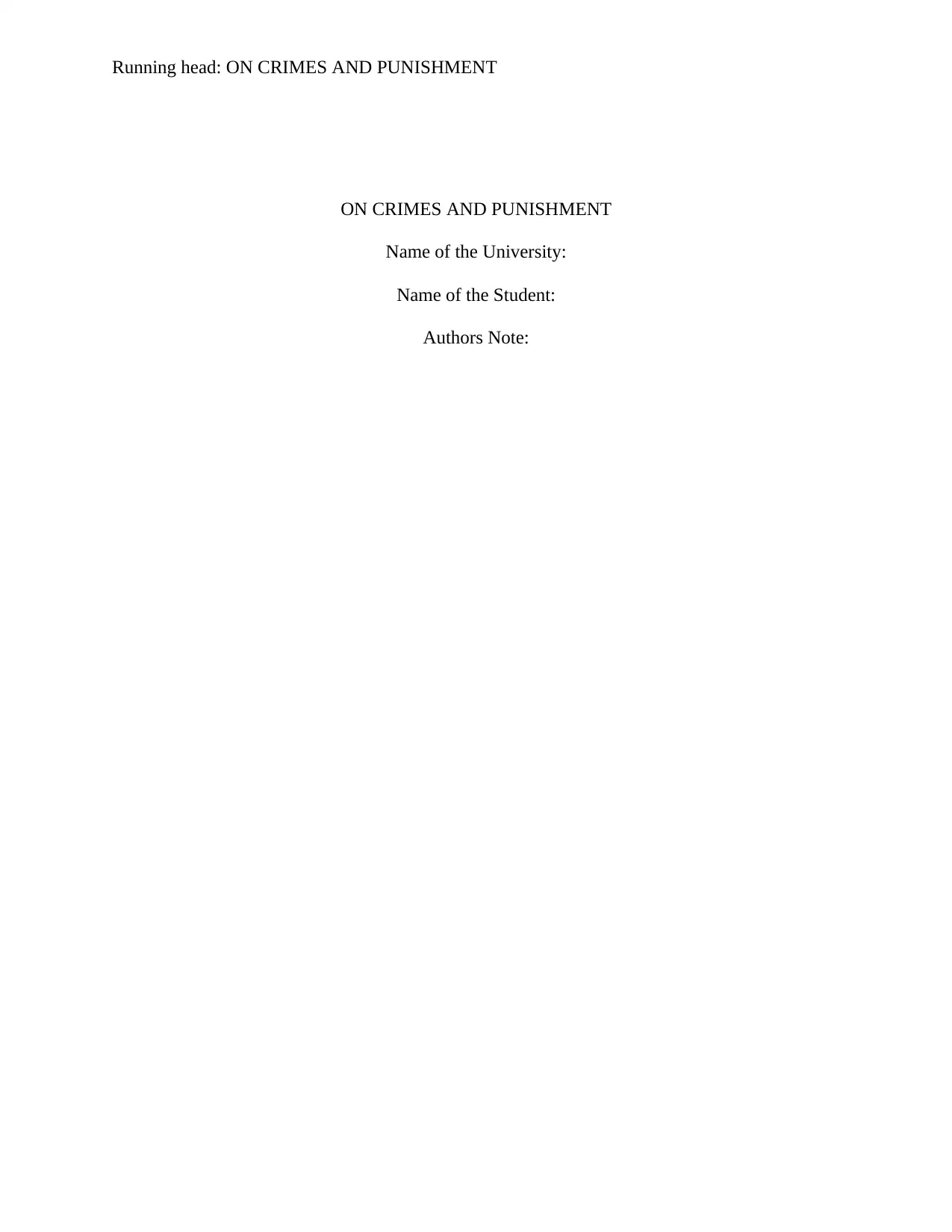
Running head: ON CRIMES AND PUNISHMENT
ON CRIMES AND PUNISHMENT
Name of the University:
Name of the Student:
Authors Note:
ON CRIMES AND PUNISHMENT
Name of the University:
Name of the Student:
Authors Note:
Paraphrase This Document
Need a fresh take? Get an instant paraphrase of this document with our AI Paraphraser
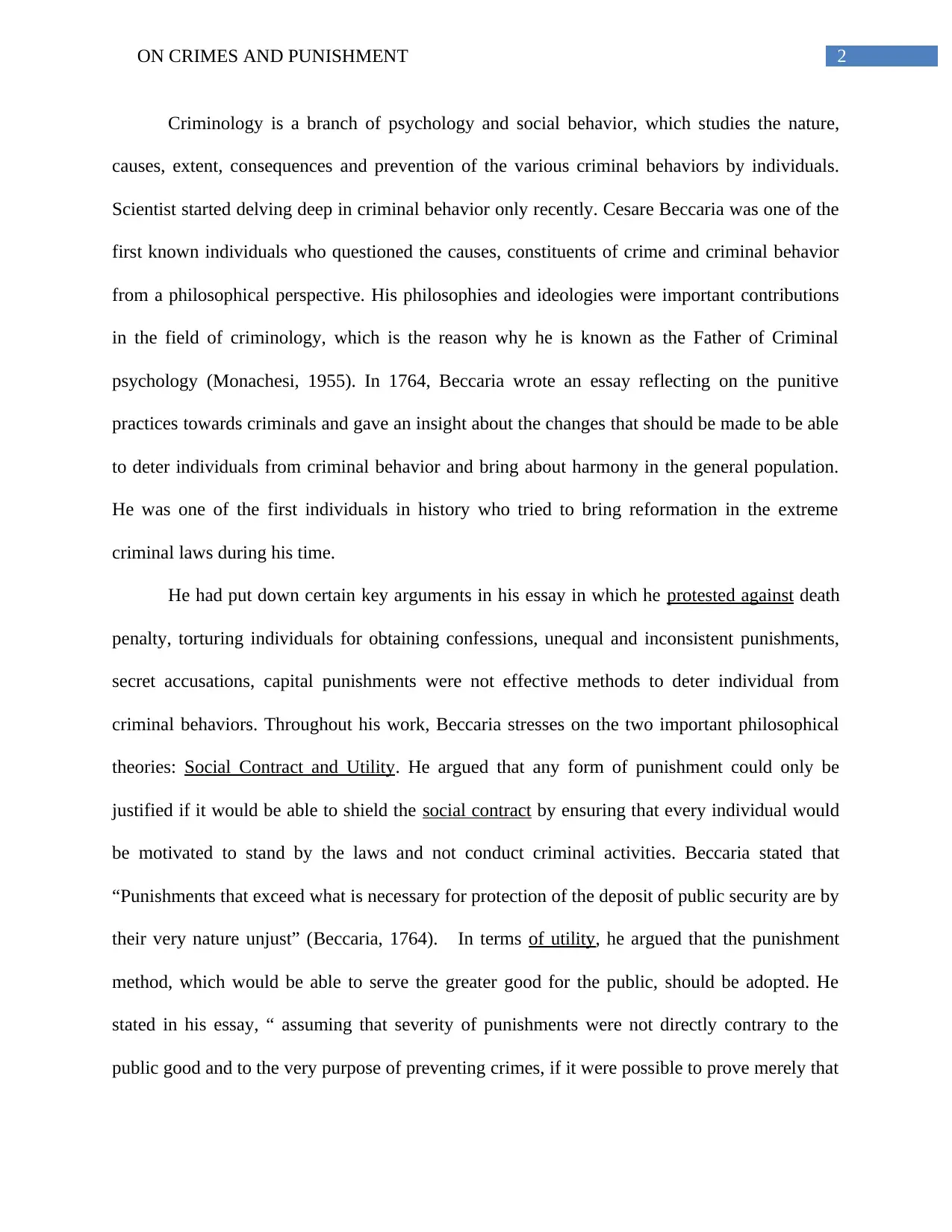
2ON CRIMES AND PUNISHMENT
Criminology is a branch of psychology and social behavior, which studies the nature,
causes, extent, consequences and prevention of the various criminal behaviors by individuals.
Scientist started delving deep in criminal behavior only recently. Cesare Beccaria was one of the
first known individuals who questioned the causes, constituents of crime and criminal behavior
from a philosophical perspective. His philosophies and ideologies were important contributions
in the field of criminology, which is the reason why he is known as the Father of Criminal
psychology (Monachesi, 1955). In 1764, Beccaria wrote an essay reflecting on the punitive
practices towards criminals and gave an insight about the changes that should be made to be able
to deter individuals from criminal behavior and bring about harmony in the general population.
He was one of the first individuals in history who tried to bring reformation in the extreme
criminal laws during his time.
He had put down certain key arguments in his essay in which he protested against death
penalty, torturing individuals for obtaining confessions, unequal and inconsistent punishments,
secret accusations, capital punishments were not effective methods to deter individual from
criminal behaviors. Throughout his work, Beccaria stresses on the two important philosophical
theories: Social Contract and Utility. He argued that any form of punishment could only be
justified if it would be able to shield the social contract by ensuring that every individual would
be motivated to stand by the laws and not conduct criminal activities. Beccaria stated that
“Punishments that exceed what is necessary for protection of the deposit of public security are by
their very nature unjust” (Beccaria, 1764). In terms of utility, he argued that the punishment
method, which would be able to serve the greater good for the public, should be adopted. He
stated in his essay, “ assuming that severity of punishments were not directly contrary to the
public good and to the very purpose of preventing crimes, if it were possible to prove merely that
Criminology is a branch of psychology and social behavior, which studies the nature,
causes, extent, consequences and prevention of the various criminal behaviors by individuals.
Scientist started delving deep in criminal behavior only recently. Cesare Beccaria was one of the
first known individuals who questioned the causes, constituents of crime and criminal behavior
from a philosophical perspective. His philosophies and ideologies were important contributions
in the field of criminology, which is the reason why he is known as the Father of Criminal
psychology (Monachesi, 1955). In 1764, Beccaria wrote an essay reflecting on the punitive
practices towards criminals and gave an insight about the changes that should be made to be able
to deter individuals from criminal behavior and bring about harmony in the general population.
He was one of the first individuals in history who tried to bring reformation in the extreme
criminal laws during his time.
He had put down certain key arguments in his essay in which he protested against death
penalty, torturing individuals for obtaining confessions, unequal and inconsistent punishments,
secret accusations, capital punishments were not effective methods to deter individual from
criminal behaviors. Throughout his work, Beccaria stresses on the two important philosophical
theories: Social Contract and Utility. He argued that any form of punishment could only be
justified if it would be able to shield the social contract by ensuring that every individual would
be motivated to stand by the laws and not conduct criminal activities. Beccaria stated that
“Punishments that exceed what is necessary for protection of the deposit of public security are by
their very nature unjust” (Beccaria, 1764). In terms of utility, he argued that the punishment
method, which would be able to serve the greater good for the public, should be adopted. He
stated in his essay, “ assuming that severity of punishments were not directly contrary to the
public good and to the very purpose of preventing crimes, if it were possible to prove merely that
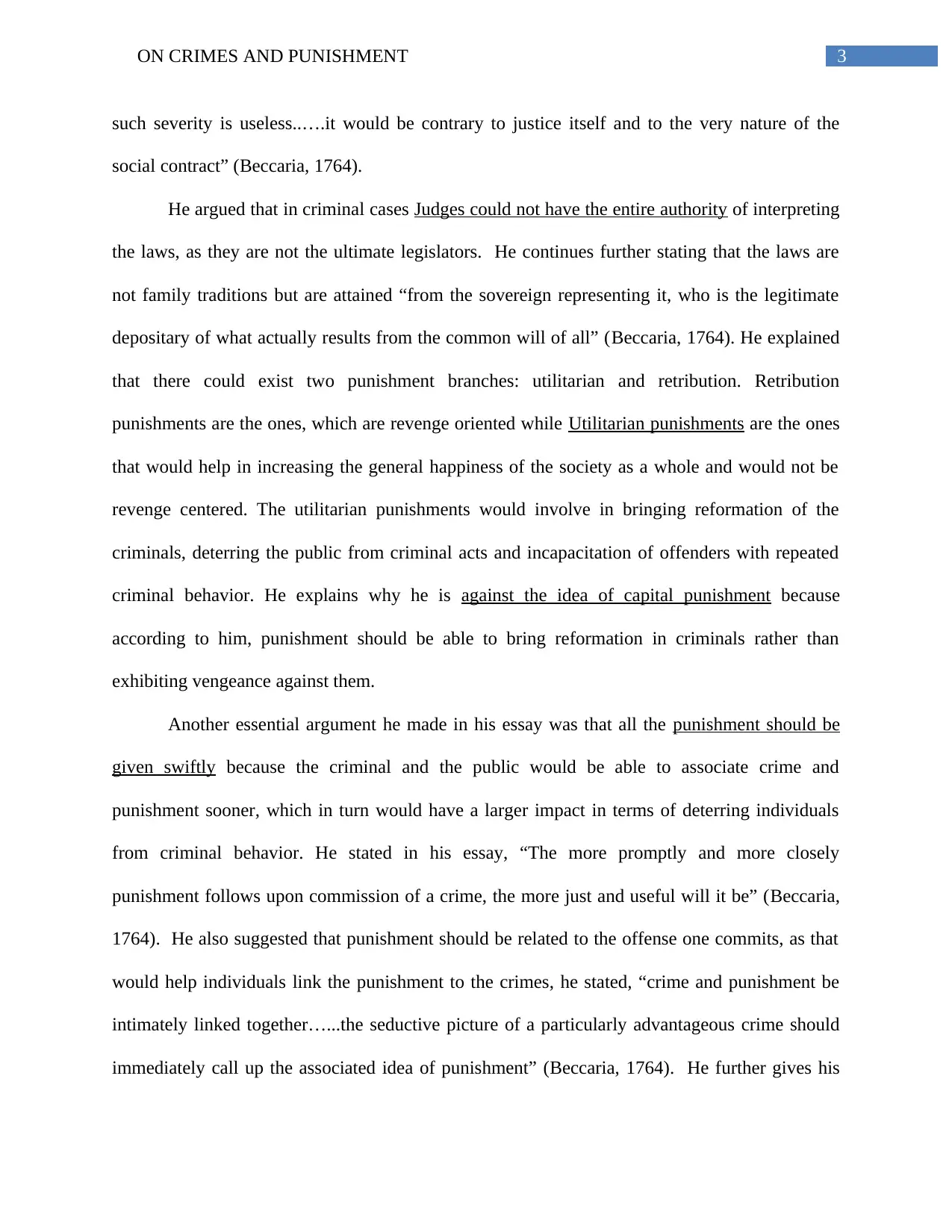
3ON CRIMES AND PUNISHMENT
such severity is useless..….it would be contrary to justice itself and to the very nature of the
social contract” (Beccaria, 1764).
He argued that in criminal cases Judges could not have the entire authority of interpreting
the laws, as they are not the ultimate legislators. He continues further stating that the laws are
not family traditions but are attained “from the sovereign representing it, who is the legitimate
depositary of what actually results from the common will of all” (Beccaria, 1764). He explained
that there could exist two punishment branches: utilitarian and retribution. Retribution
punishments are the ones, which are revenge oriented while Utilitarian punishments are the ones
that would help in increasing the general happiness of the society as a whole and would not be
revenge centered. The utilitarian punishments would involve in bringing reformation of the
criminals, deterring the public from criminal acts and incapacitation of offenders with repeated
criminal behavior. He explains why he is against the idea of capital punishment because
according to him, punishment should be able to bring reformation in criminals rather than
exhibiting vengeance against them.
Another essential argument he made in his essay was that all the punishment should be
given swiftly because the criminal and the public would be able to associate crime and
punishment sooner, which in turn would have a larger impact in terms of deterring individuals
from criminal behavior. He stated in his essay, “The more promptly and more closely
punishment follows upon commission of a crime, the more just and useful will it be” (Beccaria,
1764). He also suggested that punishment should be related to the offense one commits, as that
would help individuals link the punishment to the crimes, he stated, “crime and punishment be
intimately linked together…...the seductive picture of a particularly advantageous crime should
immediately call up the associated idea of punishment” (Beccaria, 1764). He further gives his
such severity is useless..….it would be contrary to justice itself and to the very nature of the
social contract” (Beccaria, 1764).
He argued that in criminal cases Judges could not have the entire authority of interpreting
the laws, as they are not the ultimate legislators. He continues further stating that the laws are
not family traditions but are attained “from the sovereign representing it, who is the legitimate
depositary of what actually results from the common will of all” (Beccaria, 1764). He explained
that there could exist two punishment branches: utilitarian and retribution. Retribution
punishments are the ones, which are revenge oriented while Utilitarian punishments are the ones
that would help in increasing the general happiness of the society as a whole and would not be
revenge centered. The utilitarian punishments would involve in bringing reformation of the
criminals, deterring the public from criminal acts and incapacitation of offenders with repeated
criminal behavior. He explains why he is against the idea of capital punishment because
according to him, punishment should be able to bring reformation in criminals rather than
exhibiting vengeance against them.
Another essential argument he made in his essay was that all the punishment should be
given swiftly because the criminal and the public would be able to associate crime and
punishment sooner, which in turn would have a larger impact in terms of deterring individuals
from criminal behavior. He stated in his essay, “The more promptly and more closely
punishment follows upon commission of a crime, the more just and useful will it be” (Beccaria,
1764). He also suggested that punishment should be related to the offense one commits, as that
would help individuals link the punishment to the crimes, he stated, “crime and punishment be
intimately linked together…...the seductive picture of a particularly advantageous crime should
immediately call up the associated idea of punishment” (Beccaria, 1764). He further gives his
⊘ This is a preview!⊘
Do you want full access?
Subscribe today to unlock all pages.

Trusted by 1+ million students worldwide
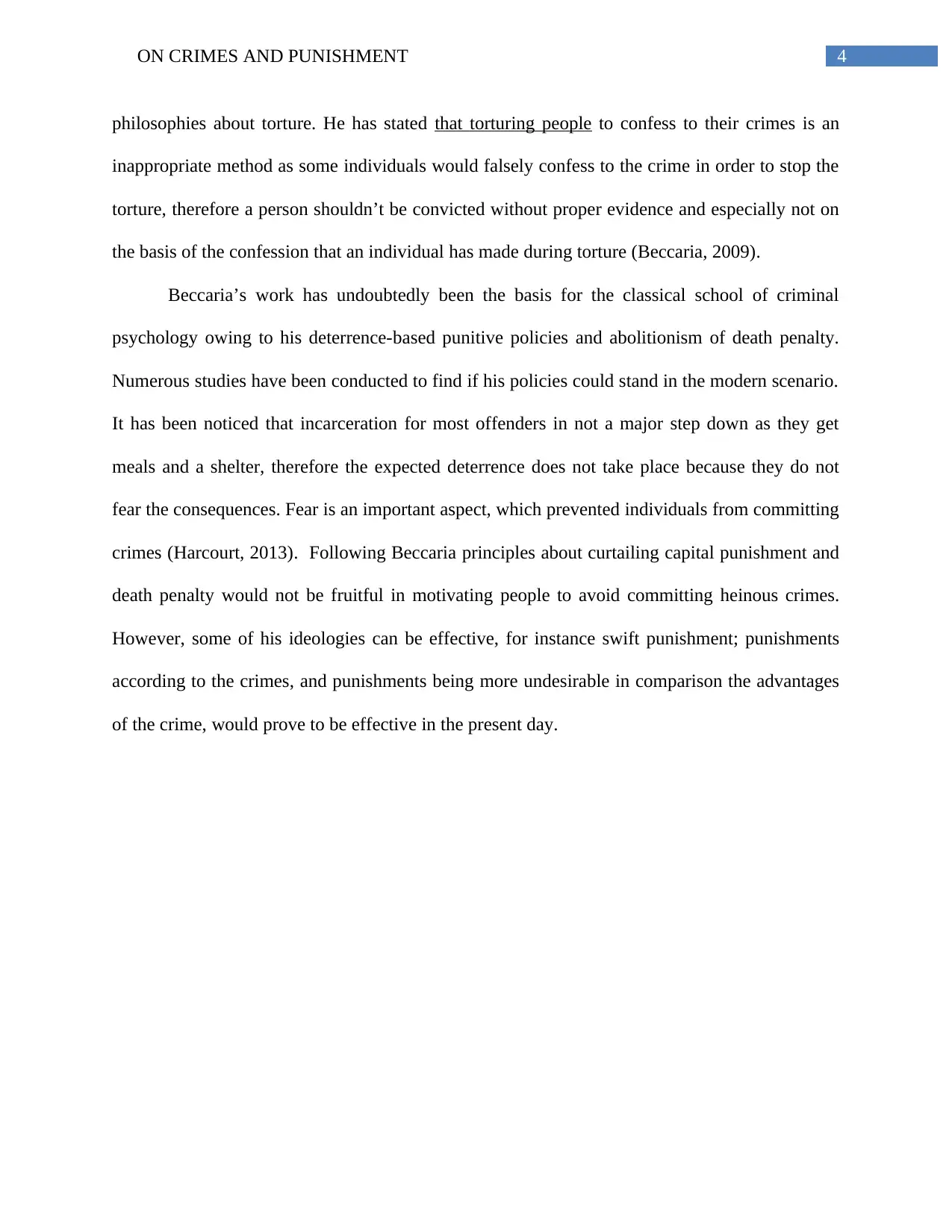
4ON CRIMES AND PUNISHMENT
philosophies about torture. He has stated that torturing people to confess to their crimes is an
inappropriate method as some individuals would falsely confess to the crime in order to stop the
torture, therefore a person shouldn’t be convicted without proper evidence and especially not on
the basis of the confession that an individual has made during torture (Beccaria, 2009).
Beccaria’s work has undoubtedly been the basis for the classical school of criminal
psychology owing to his deterrence-based punitive policies and abolitionism of death penalty.
Numerous studies have been conducted to find if his policies could stand in the modern scenario.
It has been noticed that incarceration for most offenders in not a major step down as they get
meals and a shelter, therefore the expected deterrence does not take place because they do not
fear the consequences. Fear is an important aspect, which prevented individuals from committing
crimes (Harcourt, 2013). Following Beccaria principles about curtailing capital punishment and
death penalty would not be fruitful in motivating people to avoid committing heinous crimes.
However, some of his ideologies can be effective, for instance swift punishment; punishments
according to the crimes, and punishments being more undesirable in comparison the advantages
of the crime, would prove to be effective in the present day.
philosophies about torture. He has stated that torturing people to confess to their crimes is an
inappropriate method as some individuals would falsely confess to the crime in order to stop the
torture, therefore a person shouldn’t be convicted without proper evidence and especially not on
the basis of the confession that an individual has made during torture (Beccaria, 2009).
Beccaria’s work has undoubtedly been the basis for the classical school of criminal
psychology owing to his deterrence-based punitive policies and abolitionism of death penalty.
Numerous studies have been conducted to find if his policies could stand in the modern scenario.
It has been noticed that incarceration for most offenders in not a major step down as they get
meals and a shelter, therefore the expected deterrence does not take place because they do not
fear the consequences. Fear is an important aspect, which prevented individuals from committing
crimes (Harcourt, 2013). Following Beccaria principles about curtailing capital punishment and
death penalty would not be fruitful in motivating people to avoid committing heinous crimes.
However, some of his ideologies can be effective, for instance swift punishment; punishments
according to the crimes, and punishments being more undesirable in comparison the advantages
of the crime, would prove to be effective in the present day.
Paraphrase This Document
Need a fresh take? Get an instant paraphrase of this document with our AI Paraphraser
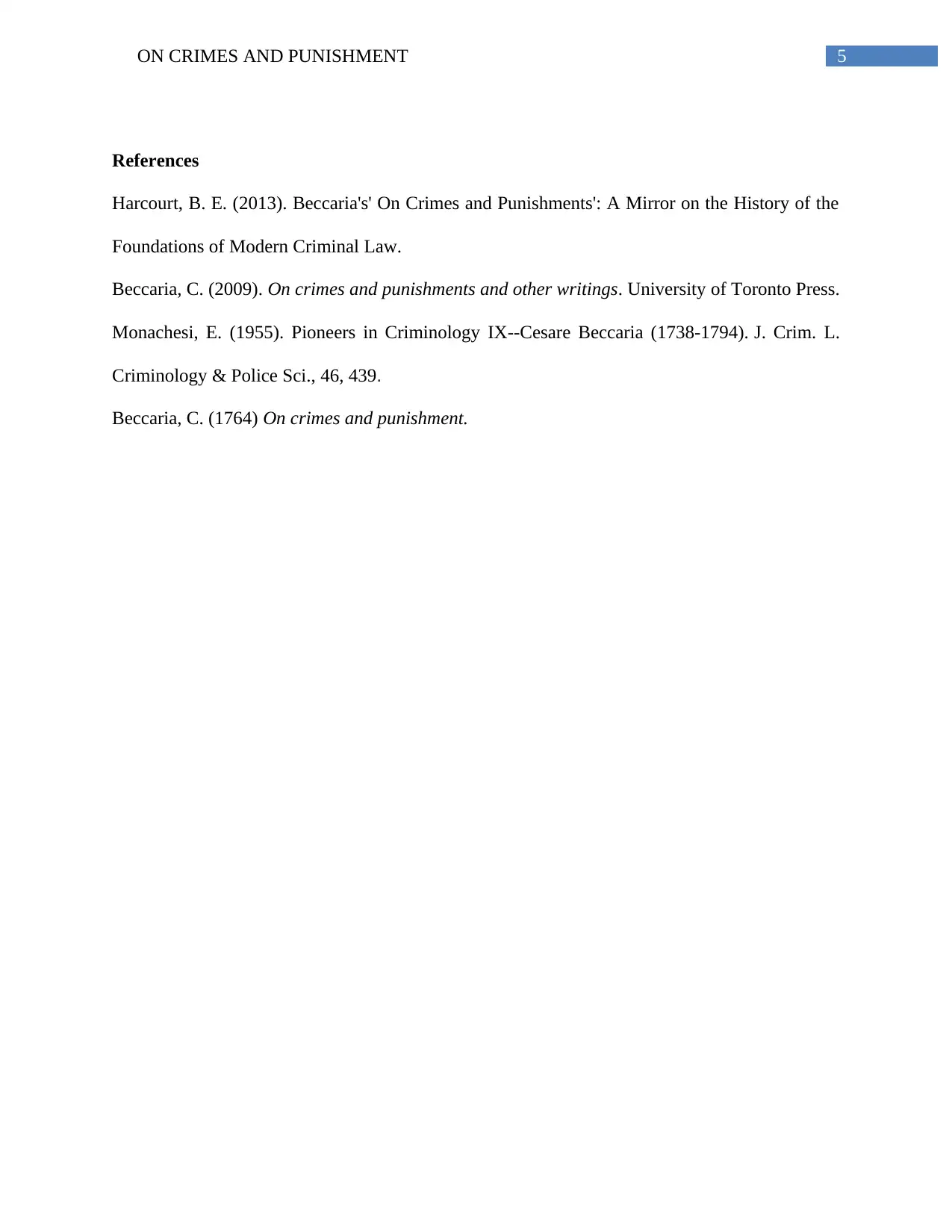
5ON CRIMES AND PUNISHMENT
References
Harcourt, B. E. (2013). Beccaria's' On Crimes and Punishments': A Mirror on the History of the
Foundations of Modern Criminal Law.
Beccaria, C. (2009). On crimes and punishments and other writings. University of Toronto Press.
Monachesi, E. (1955). Pioneers in Criminology IX--Cesare Beccaria (1738-1794). J. Crim. L.
Criminology & Police Sci., 46, 439.
Beccaria, C. (1764) On crimes and punishment.
References
Harcourt, B. E. (2013). Beccaria's' On Crimes and Punishments': A Mirror on the History of the
Foundations of Modern Criminal Law.
Beccaria, C. (2009). On crimes and punishments and other writings. University of Toronto Press.
Monachesi, E. (1955). Pioneers in Criminology IX--Cesare Beccaria (1738-1794). J. Crim. L.
Criminology & Police Sci., 46, 439.
Beccaria, C. (1764) On crimes and punishment.
1 out of 5
Related Documents
Your All-in-One AI-Powered Toolkit for Academic Success.
+13062052269
info@desklib.com
Available 24*7 on WhatsApp / Email
![[object Object]](/_next/static/media/star-bottom.7253800d.svg)
Unlock your academic potential
Copyright © 2020–2026 A2Z Services. All Rights Reserved. Developed and managed by ZUCOL.




